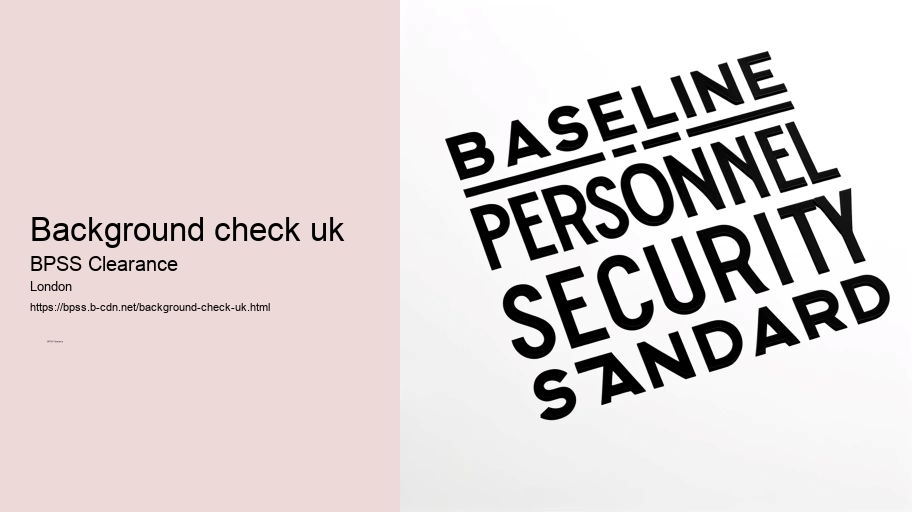
Regarding regulatory compliance, both standards must adhere to the UK's data protection laws, including GDPR. However, BS7858:2019 also outlines specific storage and handling procedures for the sensitive information gathered during the vetting process, reflecting its more rigorous data collection. This includes requirements for how data should be secured and the duration it can be kept before needing to be securely disposed of.
- Report any changes in personal circumstances that may affect your clearance status promptly.
The verification of essential documents plays a pivotal role in the recruitment process requirements for obtaining BPSS clearance. To guarantee a thorough evaluation of candidates, organizations typically follow these steps:Applicants need to provide documents like a passport or driver's license to confirm their identity.
When undertaking BPSS clearance, organizations must verify four main components: identity confirmation, employment history, criminal record, and right to work status. This comprehensive approach ensures that all aspects of an individual's background are scrutinized, providing a holistic view of their suitability for sensitive roles. The thoroughness of BPSS clearance helps prevent any potential security breaches that could arise from incomplete background checks.
However, for positions where exposure to SECRET and TOP SECRET information is probable, BPSS stands out as a fundamental baseline standard ensuring the trustworthiness and eligibility of individuals in sensitive roles.
When it comes to safeguarding sensitive information and ensuring trustworthiness in certain roles, the BPSS check plays a pivotal role. Have you ever wondered how this meticulous screening process impacts various sectors and the individuals involved? Delving into the intricacies of BPSS clearance can reveal a world of protocols, challenges, and future adaptations that are essential for maintaining security standards. Understanding the nuances of this screening procedure could shed light on its significance in today's security-conscious landscape.

3. **Check Criminal Records:** Perform a background check to identify any criminal history that could pose a risk.
IT professionals working with government systems manage secure networks and data that, if compromised, could pose significant risks to national security. BPSS clearance ensures that those tasked with this responsibility are verified to be reliable and trustworthy.
3. Some organizations may mandate more frequent renewals based on internal policies.
Digital technology has significantly streamlined the Baseline Personnel Security Standard (BPSS) process by enabling faster gathering and verification of applicant information. Automation tools and online databases allow for rapid identity verification and employment history checks, reducing the time it takes to complete a BPSS clearance compared to manual processes.
One of the major differences lies in the handling and treatment of criminal records. BPSS checks usually involve a basic disclosure, revealing only unspent convictions under the Rehabilitation of Offenders Act 1974. Conversely, BS7858:2019 can require a more thorough examination, potentially including spent convictions and other details depending on the risk assessment of the specific job role, reflecting its focus on positions where security is critically important.
In some cases, BPSS checks can encounter delays if discrepancies or issues need to be resolved, such as gaps in employment or discrepancies in personal information. Government contractors Such issues require additional investigation and possibly further documentation, which can prolong the process.

BPSS checks are generally conducted as a one-time check prior to employment to establish a baseline of trust and security clearance. Personnel trustworthiness However, depending on the nature of the work and the level of security required, BPSS checks might be revisited if a person's role or security clearance level changes.
- Cooperate fully with any additional background checks or enquiries that may be necessary.
1. BPSS clearance is usually valid for 3 years from the date of issue.
Navigating the BPSS process can pose challenges, particularly when verifying identity and employment history manually. Delays often occur during manual verification processes, impacting the overall clearance timeline.
The right to work check under BPSS serves as a legal safeguard that prevents illegal employment.
Ultimately, BPSS clearance plays a critical role in maintaining a secure work environment, reducing risks, and building trust in recruitment processes and decision-making.

BPSS clearance is essential for those working in roles that require high levels of trust and integrity, especially within the UK government. Ensuring that individuals have BPSS clearance helps maintain national security and reduces the risk of insider threats. By vetting individuals' backgrounds, the government ensures that sensitive information remains protected from those who might misuse it. This process is crucial in safeguarding the nation's security infrastructure and upholding public safety standards.
These screenings affirm identity, employment history, national and immigration status, criminal record, and time spent abroad. Individuals needing access to UK OFFICIAL assets and occasional access to UK SECRET assets must undergo BPSS screening to uphold trustworthiness, honesty, and integrity in their roles.
What Is the Difference Between Bpss and Dbs? When distinguishing between BPSS and DBS checks, it's vital to recognize that BPSS focuses on national security vetting, identity verification, and right to work status, while DBS solely examines an individual's criminal record.
